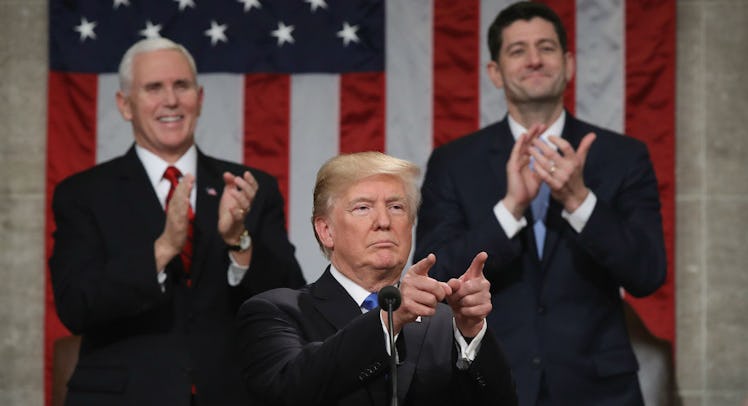What Trump Did (And Didn’t) Say to Families in His First State of the Union
The President was intent on presenting himself as a champion for families across the country.

Last night, Donald Trump gave his first State of the Union Address, during which he highlighted his administration’s accomplishments over the first year of his Presidency and laid out his vision for the next three years in office. And while Trump’s speech was delivered to all Americans, the President seemed particularly interested in appealing to families, as he proclaimed “faith and family, not government and bureaucracy, are the center of the American life.” Over the course of his lengthy speech, Trump highlighted the myriad ways he believes his policies are benefitting parents and their kids.
The biggest selling point Trump made to families was the massive tax bill Congress passed last month. According to the President, a family of four making $75,000 will now save $2,000. He also painted the dramatic cut in the business tax rate, from 35 percent to 21 percent, as a pro-family policy, citing experts who estimate it will “increase average family income by more than $4,000.” Of course, many have challenged Trump regarding his tax policies, arguing that the relief provided for lower and middle-class families is only temporary and that, in the long-term, the new bill will only benefit the wealthy.
Trump also tried to assuage the concerns many have about his aggressive immigration policies, which have increased deportations and immigration arrests significantly and separated a number of ‘Dreamer’ parents from their children. He laid out his new immigration reform package that offers “a path to citizenship for 1.8 million illegal immigrants who were brought here by their parents at a young age.” The plan, however, has already met fierce criticism both from Democrats and members of his own party, as it proposes to end the visa lottery for legal immigration and fund a wall on the southern border in exchange for the Dreamer’s amnesty. He also said his plan will end chain migration (or Family Reunification, as Democrats call it), which means that green-card holders or legal U.S. residents will only be able to sponsor immediate family members for immigration to the United States, excluding grandparents and other relatives.
The President briefly mentioned the importance of family leave to support working families but provided no clear plan to do so. Despite being a major promise during the campaign, Trump has thus far made no effort to reform family leave in the workplace.
This article was originally published on